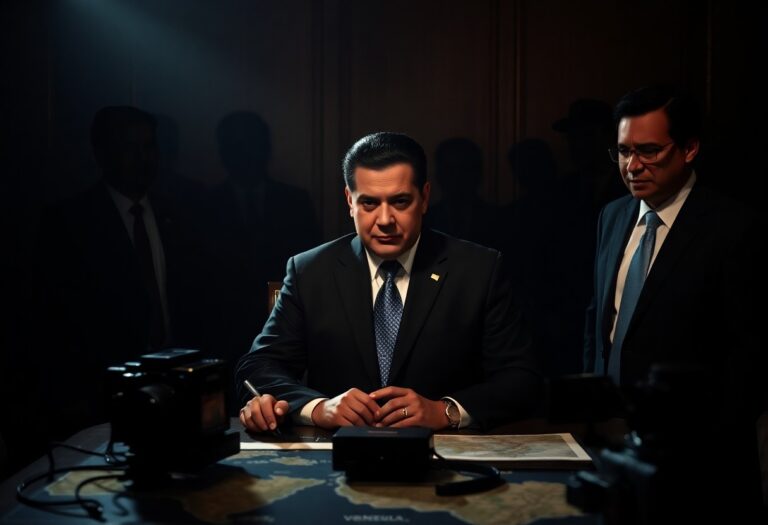Just as you consider the implications of alleged collusion in Venezuela, it’s vital to understand how this can mold the future under President Maduro. With external interests potentially influencing domestic policies, your perspective on economic stability and political integrity in Venezuela may shift dramatically. The challenges brought about by international relations, along with the overarching influence of collusive practices, could deepen the nation’s crisis or even pave the way for transitional opportunities for the Venezuelan people. In this blog post, let’s explore these dynamics in detail.
Historical Context of Venezuela Under Maduro
For the past decade, Venezuela has been a focal point of political turmoil and economic instability under the leadership of Nicolás Maduro. The government’s handling of national resources, particularly oil, has led to significant domestic and international strife. Maduro’s presidency has been marked by allegations of human rights violations, widespread protests, and a deteriorating relationship with the United States and regional allies, heavily impacting the lives of Venezuelans.
Political Landscape
Across Venezuela, the political landscape has been dominated by the ruling United Socialist Party and its efforts to maintain power through various means, including suppression of dissent and manipulation of electoral processes. With an increasingly polarized society, you are likely to witness heightened tensions as opprobrium against Maduro’s regime persists.
Economic Challenges
Among the multiple challenges facing Venezuela, the economy has been in freefall, leading to hyperinflation, widespread poverty, and a dire humanitarian crisis. You should note the intricate connection between these economic difficulties and the political maneuvers of Maduro’s government.
In fact, the collapse of Venezuela’s oil industry, once the backbone of the economy, has plunged the nation into a state of emergency. Your access to basic goods and necessary services has sharply declined, with soaring prices making sustenance increasingly unaffordable. Furthermore, the government’s attempts to rectify the situation through currency controls and state intervention have often resulted in mismanagement and corruption, deepening the socio-economic divide. The ongoing challenges highlight the dire need for effective reforms and avenues for international support.
Allegations of Collusion
It is imperative to examine the myriad allegations of collusion surrounding the Maduro administration, as they raise significant concerns about governance and sovereignty in Venezuela. These claims can influence public perception, diplomatic relationships, and the political landscape, thereby shaping the future of the nation’s governance and stability.
Domestic Accusations
Behind the scenes, various domestic groups have accused President Maduro of forming alliances with criminal organizations, including drug cartels and militant factions. This alleged collusion fosters a climate of fear among citizens and undermines public trust in government institutions, creating a volatile environment where corruption may thrive.
International Responses
An increasing number of countries are expressing serious concern over the accusations leveled against Maduro’s regime. They emphasize the risks associated with alleged collusion impacting not only Venezuelan society but also regional stability.
But the international community’s response could be a double-edged sword. While some nations may impose sanctions to pressure Maduro, others view these allegations as a means of interfering in Venezuela’s sovereignty. The implications of external reactions can lead to further isolation or potential partnerships, altering the nation’s course dramatically. Your understanding of these international dynamics is vital as they could precipitate either a more authoritarian regime or a possible opening for democracy, shaping the future landscape of Venezuela.

Implications for Governance
While the fallout from allegations of collusion may redefine governance in Venezuela, it could breed further instability within the Maduro regime. The political landscape may become increasingly polarized, forcing you to consider how these dynamics will foster tensions among various factions. Moreover, the ramifications might lead to severe mismanagement as officials wrestle with diminished credibility. You can explore more on the implications and the current political situation through Venezuela: Background and U.S. Relations – CRS Reports.
Impact on Regime Legitimacy
On a fundamental level, the legitimacy of the Maduro regime could face significant challenges as accusations circulate. As international scrutiny intensifies, you may see increased dissent within the population, leading to protests and growing calls for reform. The more Maduro’s government is perceived as illegitimate, the more pressure it may face from both domestic and international actors, which can threaten its hold on power.
Potential Shifts in Policy
Before the allegations become a backdrop for policy change, you might witness shifts aimed at appeasing both detractors and supporters. This could involve adjusting economic policies or law enforcement strategies to regain favor with the populace. How Maduro navigates this could be pivotal in maintaining authority.
Due to the urgent need for legitimacy, you may find that Maduro’s administration will focus on altering its policy landscape to align with popular demands. This could lead to increased social welfare programs aimed at mitigating public dissatisfaction, or even shifts in foreign policy to improve relationships with key allies. However, such adjustments might be superficial, risking the emergence of authoritarian tactics as a means to suppress dissent, highlighting an ongoing struggle between power consolidation and genuine governance reform.
Social Repercussions
Despite the potential for political turbulence, the social landscape in Venezuela is equally affected by allegations of collusion. A growing sense of fear permeates communities, as many question the integrity of their leaders and the fairness of governance. Increased repression may lead to further political polarization, creating divisions within society that can undermine social cohesion.
Public Sentiment and Response
At this juncture, the general public sentiment is one of mistrust and uncertainty. As allegations surface, citizens are grappling with their perception of the government, leading to increased protests and civil unrest. People are becoming more vocal about their frustration, demanding change and transparency in governance.
Role of Civil Society
For many Venezuelans, civil society organizations serve as necessary conduits for advocacy and community support. They play a vital role in mobilizing citizens and facilitating dialogue about democratic reforms and human rights issues. Such organizations can empower individuals, encouraging engagement in the political process and fostering a sense of collective action.
To navigate these tumultuous times, civil society becomes your ally. Through grassroots movements and active participation, you can influence policy decisions and advocate for your rights. These groups often provide support networks for those impacted by government repression, focusing on social justice and community resilience. By engaging with civil society, you not only elevate your voice but also contribute to a broader movement aimed at fostering democratic values and accountability, paving the way for a brighter future amidst adversity.
International Relations and Diplomacy
Unlike previous administrations, President Maduro’s internal and external policies have significantly strained Venezuela’s relations with various nations. The alleged collusion that has surfaced may further isolate your country diplomatically, complicating negotiations with international partners and impacting aid or support initiatives. As you investigate into the intricacies of these diplomatic dynamics, you’ll uncover the delicate balance Venezuela must strike between maintaining sovereignty and appeasing foreign interests that can sway your political landscape.
Regional Reactions
Along the spectrum of regional responses, you find a mix of solidarity and condemnation in Latin America. Countries such as Brazil and Colombia have expressed concern over Venezuela’s stability, while others, like Bolivia and Nicaragua, may offer Maduro their tacit support. Your understanding of these diverse reactions is necessary in assessing the broader implications for Venezuela’s future under Maduro’s regime.
Global Strategic Interests
Before you analyze the complexities of global strategic interests, it’s vital to recognize that Venezuela’s oil reserves are among the largest in the world, making them highly coveted. Several superpowers eye these resources with a vested interest that could shape their policies and engagements with your country. Dominant players like Russia and China have shown support for Maduro, while the U.S. has adopted a more adversarial approach—these contrasting strategies highlight the diverse global geopolitical agenda surrounding Venezuela.
Another factor influencing global strategic interests concerns the potential for political instability in Venezuela to trigger economic repercussions far beyond its borders. Major nations are keenly aware that a collapse could lead to a refugee crisis, destabilizing neighboring countries, and disrupting oil supplies. Support for Maduro or alternatives to his government will be shaped by how nations prioritize their own economic and political stability against the backdrop of your country’s internal challenges. The ongoing tug-of-war for influence not only affects your nation’s future but also reflects deeper aspirations on the global stage.
Future Scenarios
After analyzing the current political landscape in Venezuela, you can envision several potential trajectories for the nation under Maduro’s leadership. The implications of alleged collusion could either reinforce the existing regime or open the door for significant transformations, each carrying its own set of opportunities and challenges for both the populace and the international community.
Continuation of Current Policies
About the continuation of Maduro’s current policies, it seems likely that unless significant pressure arises from outside forces or internal dissent, you may witness a steadfast adherence to strategies that prioritize state control and suppression of opposition. This path could further entrench poverty and discontent among the Venezuelan populace while perpetuating the status quo.
Opportunities for Reform
Scenarios that incorporate opportunities for reform suggest that you could see a shift in governance if internal factions become more assertive or if economic conditions worsen to a breaking point. Engaging in pragmatic dialogue with opposition forces or the international community may lead to policies that prioritize humanitarian aid, economic restoration, and the gradual establishment of democratic processes, potentially reshaping the nation’s future positively.
The emergence of reform in Venezuela under Maduro would require a delicate balance of power, as the government may be pressured to adopt more inclusive economic measures and respect human rights. You must understand that such a shift could stimulate foreign investment and aid, which are vital for economic recovery. However, be aware of the risk of backlash from hardline factions within the regime, which could resist changes, leading to potential instability. Your engagement with this evolving narrative is imperative for grasping the possibilities ahead.
Conclusion
Summing up, the allegations of collusion surrounding Maduro’s regime can significantly influence Venezuela’s trajectory. You may find that these accusations may lead to increased international isolation, tightening sanctions, and potential shifts in internal power dynamics. As this political landscape evolves, your understanding of global reactions and local sentiments will shape how you perceive the future of governance and stability in Venezuela. Staying informed on these developments will be imperative for grasping the complexities that lie ahead for the Venezuelan people.






0 Comments